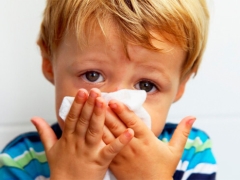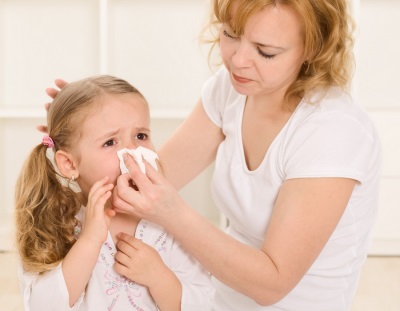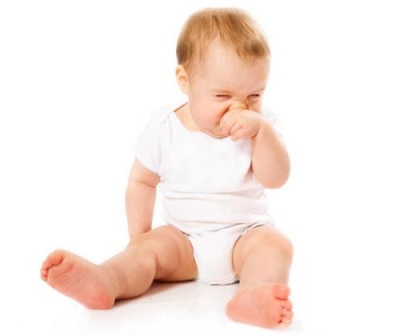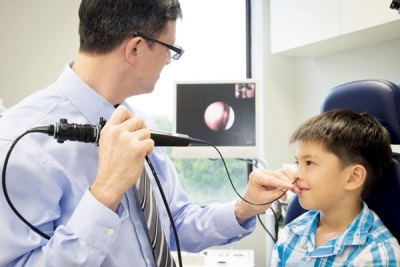What to do if the child does not pass a cold?
A runny nose in childhood is one of the most common symptoms of respiratory diseases. In most cases, it does not even require treatment or is easily treated as folk remedies, and drugs. But a situation where a runny nose does not go away 2 weeks after the onset of the illness, or even a month later, can excite any mother. Why, then, can rhinitis take such a long course and how should parents act in such cases?
The reasons
Quite often, a prolonged run of a cold leads to a situation where parents and doctors did not understand the cause of the disease, so all measures to combat it are ineffective. In this case, the child suffers not only from the symptoms of a runny nose (it interferes with breathing, sleeping, eating, feeling smells and tastes), but also from various manipulations that do not bring relief.
The reasons for a situation where a runny nose does not pass 10 days or more may be:
- The physiological reaction of the mucous membrane of newborns. It occurs when the infant’s respiratory tract becomes accustomed to breathing conditions outside the womb. This is manifested by a runny nose, which can last up to 8-10 weeks. Its symptoms are sniffing and "sniffing" the nose, as well as a small amount of transparent snot from the nose of the little ones. The general well-being of the baby does not suffer and such a runny nose does not require any treatment.
- Sinusitis. In addition to the long runny nose, the child’s sense of smell is also disturbed, the voice becomes nasal, and the body temperature rises. The baby may complain of pain and discomfort in the area of the affected paranasal sinuses. The general condition of the baby, as a rule, suffers greatly, forcing parents to immediately seek medical help.
- Allergic reaction. Long runny nose with watery, clear discharge, caused by this cause, usually accompanied by sneezing, itching in the nasopharynx, difficulty breathing at night. The effect of pollen from flowering plants, household dust, mold, synthetic substances from household chemicals, wool, lint and other allergens leads to its appearance. In many children, allergic rhinitis is combined with dermatitis, food allergies and even asthma.
- Adenoids. Due to the excessive proliferation of the tonsil tissue in a child, breathing through the nose is disturbed and local immunity suffers. The disease can be identified by the appearance of nasal voices, snoring in sleep, or constant mouth breathing.
- Complications of acute rhinitis. HOften it is caused by viruses, but when a bacterial infection joins the disease becomes long and requires a change in treatment tactics. Most often, bacterial complications are caused by staphylococci, pneumococci, and hemophilic rods. At the same time, the nature of nasal discharge changes - they become thick, yellowish at first, and then greenish. The risk of sinusitis or otitis media increases.
Dr. Komarovsky also talks about the causes of the common cold in his program:
More rare factors causing a long course of rhinitis are:
- Hit foreign body into the nasal cavity.
- Teething of teeth.
- Curved nasal septum.
- Polyps or other tumors in the nasal cavity.
What to do
When to see a doctor
Show the child a pediatrician or ENT should, if:
- Runny nose does not pass longer than 10 days.
- The child's nose is constantly laid, therefore the baby breathes only with the mouth.
- Have a child decreased or completely lost his sense of smell.
- From the nose stands out yellow-green thick mucus.
- Child complains itchy nose and headaches.
- Kid sluggish and sleeps badly.
Survey
A child who does not have a runny nose for 10 days or longer will be assigned:
- Complete blood count with the definition of leukoformuly. Such an examination will help confirm the bacterial infection or the allergic nature of the disease.
- Rhinoscopy. The doctor will examine the nasal cavity using a frontal reflector and a nasal mirror (with anterior rhinoscopy) or a nasopharyngeal mirror and a spatula (with a posterior rhinoscopy). The survey will help to see the condition of the nasal septum and the concha. If a suspicion of sinusitis appears, endoscopic rhinoscopy may be performed.
- Examination of nasal discharge. A child may have a smear test, PCR to detect viruses or bacteria, as well as bacterial screening to determine the sensitivity of the flora to antimicrobial drugs.
- Diaphanoscopy. Such a study of the paranasal sinuses using x-ray is now often prescribed instead of an x-ray examination. It is carried out in a dark room to determine whether the paranasal sinuses conduct light. Normally, they skip it well, and with inflammation there will be darkening.
Treatment
- If the runny nose in the infant during the first months of life is physiological, no specific treatment is required from the parents. It is only necessary to create a crumbs optimal conditions for breathing - clean the air, moisten it, maintain a comfortable temperature of the air.
- In the treatment of viral rhinitis, complicated by a bacterial infection, use drugs, which include antiseptics or antibiotics. They must be prescribed by a doctor, because such drugs, although differing in local effects, also have side effects. In the treatment of such prolonged rhinitis are used Protargol, Dioxidine, Miramistin, Isofra, Polydex and other medicines.
- If the cause of a prolonged rhinitis is an allergy, first of all, the influence of allergens on the children's body should be excluded. The doctor will also prescribe a specific treatment using anti-inflammatory and antihistamine drugs, for example, Zyrtec drops. In addition, children with such a runny nose are shown moisturizing the nose with saline or with sea salt.
- In a situation where a long runny nose provoke adenoids, the question of treatment tactics should be decided by the doctor. In some cases, fairly conservative methods, but sometimes not do without surgery.
In detail about the methods of treatment will tell the pediatric otolaryngologist I.V. Leskov:














